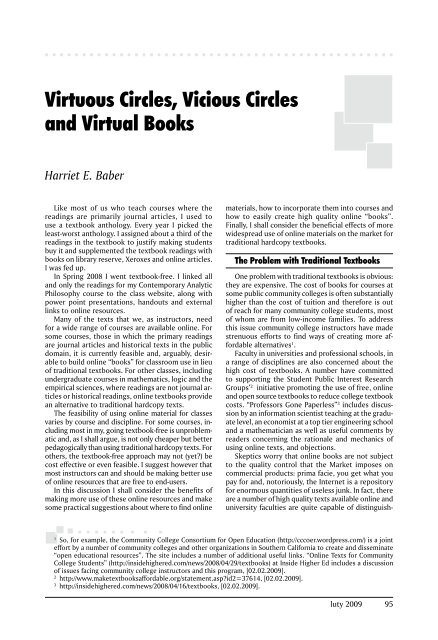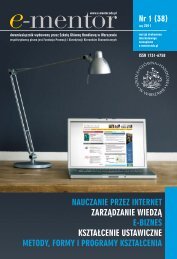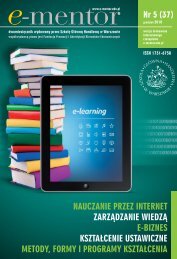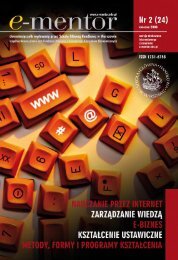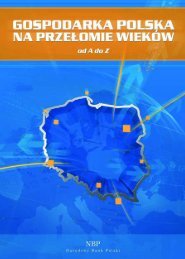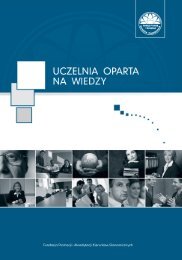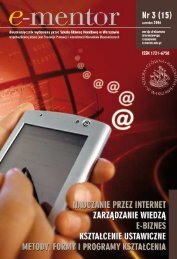e-bizneszarządzania portfelem projektów IT jest próba radzeniasobie przez IT z często występującą sytuacją, gdyprzedsiębiorstwa nie są na tyle dojrzałe, aby realizowaćprojekty w ramach jasno określonych programów.Wówczas grupowanie projektów IT w powiązaniuz określonym celem biznesowym pozwala nadaćim odpowiedni priorytet i zapewnić koordynacjęw dostarczaniu określonych zdolności.PodsumowanieZapewnienie efektywnej i skutecznej transformacjibiznesowej jest jednym z kluczowych wyzwańwspółczesnych przedsiębiorstw. Jest to obszar,w którym dopiero w ostatnich 2–3 latach wypracowanokompleksowe metody zarządzania. Dodatkowymutrudnieniem jest zapewnienie koordynacji transformacjiIT i biznesu. W praktyce często właśnie od ITrozpoczynają się próby uporządkowania procesówzarządzania projektami, programami i portfelem,co czasami prowadzi do budowy nieefektywnychrozwiązań skupiających się na wewnętrznych celachIT zamiast na celach całego przedsiębiorstwa.Transformacja IT powinna być integralnym elementemtransformacji biznesu. Dla skutecznościi efektywności transformacji IT niezbędne jest odpowiedniezaangażowanie biznesu w celu zapewnieniawłaściwych struktur nadzoru nad portfelem projektówIT, odpowiedniej charakterystyki tego portfela i wymaganychzasobów oraz biznesowych priorytetów dlaprojektów IT i skoordynowanego zarządzania zależnościamimiędzy tymi projektami, z punktu widzeniarealizacji korzyści dla całego przedsiębiorstwa.Bibliografia dostępna jest w wersji internetowej czasopisma.Autor jest adiunktem w Katedrze Small Businessu SGH, doktorem nauk ekonomicznych w zakresie zarządzania(SGH) oraz kierownikiem Studiów Podyplomowych SGH: Efektywne Zarządzanie IT w Przedsiębiorstwie. Napisał szeregartykułów dotyczących badań przedsiębiorstw w zakresie wykorzystania technologii informacyjnych w zarządzaniu.Zainteresowania naukowe autora koncentrują się wokół obszarów nadzoru IT (IT Governance) i zarządzania IT (ITManagement) oraz budowy wartości przedsiębiorstwa (Value-Based Management). Jest członkiem zarządu ISACAWarsaw Chapter (Sekretarz Generalny). Posiada kilkuletnie doświadczenie menedżerskie (menedżer ds. rozwojuw przedsiębiorstwie produkcyjnym sektora MSP), a także w zakresie zarządzania IT (m.in. kierownik projektu wdrożeniasystemu klasy ERP/MRP, konsultant w zakresie zarządzania i nadzoru IT w międzynarodowej korporacji). Obecniejest współwłaścicielem i prezesem zarządu firmy doradczej specjalizującej się w zarządzaniu i nadzorze IT.PolecamyE-marketing w akcji, czyli jak skutecznie wzbudzać pożądanie klientów i zazdrośćkonkurencji, red. Konrad Pankiewicz, Helion, Gliwice 2009Czym jest permission marketing, a czym desktop marketing? Jak strategicznie planować mediaw internecie? O czym pamiętać, tworząc społeczność wokół marki? Jak skutecznie zarządzaćprojektem e-marketingowym? Osobom poszukującym odpowiedzi na te i inne pytania z dziedzinymarketingu online polecamy publikację E-marketing w akcji, czyli jak skutecznie wzbudzaćpożądanie klientów i zazdrość konkurencji pod redakcją Konrada Pankiewicza.Książka ma charakter ściśle praktyczny i porusza wiele zagadnień obecnych na co dzień w pracyosób zajmujących się e-marketingiem, sprzedażą oraz obsługą klienta. W szerszym zakresiepublikacja adresowana jest do wszystkich zainteresowanych wykorzystaniem internetu w celachmarketingowo-sprzedażowych.Publikację można nabyć w księgarni internetowej wydawnictwa:http://helion.pl/ksiazki/emarke.htmTechnology Innovation and Industrial Management Diversity, technology and innovation for operationalcompetitiveness, 18-20 czerwca 2009 r., Bangkok, TajlandiaTematem przewodnim tegorocznej konferencji jest Diversity, Technology, and Innovation for Operational Competitiveness, a jejcelem promocja wymiany doświadczeń i pomysłów zmierzających do zarządzania organizacjami w bardziej efektywnyi innowacyjny sposób. Podkreślona zostanie rola technologii oraz integracji zasobów ludzkich i kultury organizacyjnej.Organizatorzy proponują szeroki zakres tematów do dyskusji, w tym: zarządzanie wiedzą, e-biznes, e-learning,zarządzanie zmianą, zarządzanie jakością. Konferencję poprzedzą warsztaty dla doktorantów organizowane w dniach16–17 czerwca 2009 r. w Kasetsart University. Więcej informacji na: http://www.tiimconference.org/94 e-<strong>mentor</strong> nr 1 (28)
Virtuous Circles, Vicious Circlesand Virtual BooksHarriet E. BaberLike most of us who teach courses where thereadings are primarily journal articles, I used touse a textbook anthology. Every year I picked theleast-worst anthology. I assigned about a third of thereadings in the textbook to justify making studentsbuy it and supplemented the textbook readings withbooks on library reserve, Xeroxes and online articles.I was fed up.In Spring 2008 I went textbook-free. I linked alland only the readings for my Contemporary AnalyticPhilosophy course to the class website, along withpower point presentations, handouts and externallinks to online resources.Many of the texts that we, as instructors, needfor a wide range of courses are available online. Forsome courses, those in which the primary readingsare journal articles and historical texts in the publicdomain, it is currently feasible and, arguably, desirableto build online “books” for classroom use in lieuof traditional textbooks. For other classes, includingundergraduate courses in mathematics, logic and theempirical sciences, where readings are not journal articlesor historical readings, online textbooks providean alternative to traditional hardcopy texts.The feasibility of using online material for classesvaries by course and discipline. For some courses, includingmost in my, going textbook-free is unproblematicand, as I shall argue, is not only cheaper but betterpedagogically than using traditional hardcopy texts. Forothers, the textbook-free approach may not (yet?) becost effective or even feasible. I suggest however thatmost instructors can and should be making better useof online resources that are free to end-users.In this discussion I shall consider the benefits ofmaking more use of these online resources and makesome practical suggestions about where to find onlinematerials, how to incorporate them into courses andhow to easily create high quality online “books”.Finally, I shall consider the beneficial effects of morewidespread use of online materials on the market fortraditional hardcopy textbooks.The Problem with Traditional TextbooksOne problem with traditional textbooks is obvious:they are expensive. The cost of books for courses atsome public community colleges is often substantiallyhigher than the cost of tuition and therefore is outof reach for many community college students, mostof whom are from low-income families. To addressthis issue community college instructors have madestrenuous efforts to find ways of creating more affordablealternatives 1 .Faculty in universities and professional schools, ina range of disciplines are also concerned about thehigh cost of textbooks. A number have committedto supporting the Student Public Interest ResearchGroups’ 2 initiative promoting the use of free, onlineand open source textbooks to reduce college textbookcosts. “Professors Gone Paperless” 3 includes discussionby an information scientist teaching at the graduatelevel, an economist at a top tier engineering schooland a mathematician as well as useful comments byreaders concerning the rationale and mechanics ofusing online texts, and objections.Skeptics worry that online books are not subjectto the quality control that the Market imposes oncommercial products: prima facie, you get what youpay for and, notoriously, the Internet is a repositoryfor enormous quantities of useless junk. In fact, thereare a number of high quality texts available online anduniversity faculties are quite capable of distinguish-1So, for example, the Community College Consortium for Open Education (http://cccoer.wordpress.com/) is a jointeffort by a number of community colleges and other organizations in Southern California to create and disseminate“open educational resources”. The site includes a number of additional useful links. “Online Texts for CommunityCollege Students” (http://insidehighered.com/news/2008/04/29/textbooks) at Inside Higher Ed includes a discussionof issues facing community college instructors and this program, [02.02.2009].2http://www.maketextbooksaffordable.org/statement.asp?id2=37614, [02.02.2009].3http://insidehighered.com/news/2008/04/16/textbooks, [02.02.2009].luty 2009 95
- Page 2 and 3:
3 Od redakcji3 Aktualnościmetody,
- Page 4 and 5:
metody, formy i programy kształcen
- Page 6 and 7:
metody, formy i programy kształcen
- Page 8 and 9:
metody, formy i programy kształcen
- Page 10 and 11:
metody, formy i programy kształcen
- Page 12 and 13:
metody, formy i programy kształcen
- Page 14 and 15:
metody, formy i programy kształcen
- Page 16 and 17:
metody, formy i programy kształcen
- Page 18 and 19:
metody, formy i programy kształcen
- Page 20 and 21:
metody, formy i programy kształcen
- Page 22 and 23:
metody, formy i programy kształcen
- Page 24 and 25:
e-edukacja w krajuuczniowie powinni
- Page 26 and 27:
e-edukacja w krajuBadania brytyjski
- Page 28 and 29:
e-edukacja w krajuIT literacy), obe
- Page 30 and 31:
e-edukacja w krajuspersonalizowaneg
- Page 32 and 33:
e-edukacja w krajuŚrodowisko tworz
- Page 34 and 35:
e-edukacja w krajuz założonymi ce
- Page 36 and 37:
e-edukacja w krajuniezbędne jest u
- Page 38 and 39:
e-edukacja w krajuPrzykładowa stru
- Page 40 and 41:
e-edukacja w krajuNauczanie język
- Page 42 and 43:
e-edukacja w krajusiedziby odwzorow
- Page 44 and 45: e-edukacja w krajuMożliwości zast
- Page 46 and 47: e-edukacja w krajuczy różnymi rod
- Page 48 and 49: e-edukacja w krajuPrzydatność ser
- Page 50 and 51: e-edukacja w krajumających na celu
- Page 52 and 53: e-edukacja w krajuDla dydaktyki w s
- Page 54 and 55: e-edukacja w krajuw sieci, powstaj
- Page 56 and 57: e-edukacja w krajuE-learning w orga
- Page 58 and 59: e-edukacja w kraju(24,3 proc. odpow
- Page 60 and 61: e-edukacja w krajuWykres 6. Ocena p
- Page 62 and 63: zarządzanie wiedząw przedsiębior
- Page 64 and 65: zarządzanie wiedząTabela 4. Mapow
- Page 66 and 67: zarządzanie wiedzącyjnej w zarzą
- Page 68 and 69: zarządzanie wiedząTabela 1. Przyk
- Page 72 and 73: zarządzanie wiedząAnaliza sieci s
- Page 74 and 75: zarządzanie wiedząorganization) k
- Page 76 and 77: zarządzanie wiedząSNA, wsparta od
- Page 78 and 79: kształcenie ustawicznePróbę odpo
- Page 80 and 81: kształcenie ustawicznesię z inter
- Page 82 and 83: e-biznesSpołeczne uwarunkowaniamar
- Page 84 and 85: e-biznesłem rynkowym w swojej nisz
- Page 86 and 87: e-biznesnowała rynek przewozów a
- Page 88 and 89: e-biznesZarządzanie transformacją
- Page 90 and 91: e-biznesKrok 1: definiowanie strate
- Page 92 and 93: e-biznes• dostarczonych i planowa
- Page 96 and 97: e-edukacja na świecieing them from
- Page 98 and 99: e-edukacja na świecie“Analytic P
- Page 100 and 101: e-edukacja na świecieWithout surve
- Page 102: e-edukacja na świecieGetting There


